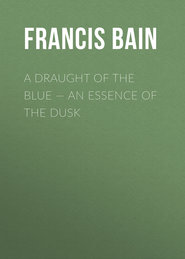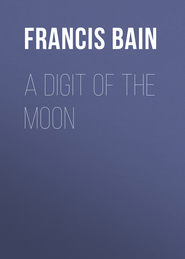По всем вопросам обращайтесь на: info@litportal.ru
(©) 2003-2024.
✖
A Mine of Faults
Настройки чтения
Размер шрифта
Высота строк
Поля
XVIII
So as he spoke, she listened, standing as if rooted to the ground, with a bosom that rose and fell in agitation, and eyes that did not dare to leave the floor. And when he ended, all at once, she looked up. And she cast a single glance, rapid as a flash of lightning, at his face, that resembled the face of one that begged for mercy, for his eyes were full of tears; and then once more she bounded like a deer towards the cliff, and stood again upon its very verge, with her back towards him, looking out over the gorge. And all at once she stooped, and covered her face with her hands. And so she stood awhile; and at last, she took her hands from her face, and turned round.
And she looked at the King, with hard eyes, and a face paler than the ashes on the body of a Pashupata ascetic. And she said, very low, and very clear, and very slowly: O King Chand, the Guru has arrived.
And instantly, the King turned like lightning to the door. And seeing nothing, he listened, and he said: Here there is nobody. Then she looked at him strangely, and said again: There is no Guru. I am myself the Guru. And as he continued to gaze at her, in perplexity, not understanding, she continued: O King Chand, thy original opinions about women were, after all, the truth. For a woman is after all, nothing, but a mass of deception, and a traitor, and now I have betrayed thee, and led thee straight into a trap.
And as the King still remained gazing silently at her in amazement, she said yet again: Thou hast all along imagined, that I was here by a chance, and our meeting was unpremeditated, and accidental: and yet it is not so. For I came here by express design and policy, to catch thee: and Yogeshwara led thee to my arbour by my advice and prearrangement, hoping to hook thee, and snare thee, by means of me, the bait and the decoy, in the meshes of his policy, making thee his instrument by means of me. And now, thou hast learned a lesson, and verified thy faith by experience, and thy dislike of women is, as thou seest, altogether solid, and founded on the truth.
And as she ended, the King stood staring at her, in a stupor, and like one whose senses have been annihilated by an overwhelming blow. And he saw before him not the woman that she was immediately before, but another altogether different. For her face resembled a very beautiful and stony mask, ice-cold, suddenly put on, as it were to hide the soul concealed below.
So as he stood, recollection suddenly came back into his heart. And he said to himself: Thus, then, the very thing predicted by my ministers, has actually occurred. And like a silly fowl, I have actually rushed into the trap, so skilfully prepared by Yogeshwara to catch me, with open eyes, forewarned.
And at the thought of Yogeshwara, all at once, pride, and utter shame, and rage rushed as it were all together into his soul, and the blood left his heart, and surged up into his brow, and lifted the very hair upon his head. And suddenly, he bowed before the King's daughter, standing absolutely still before him, like a picture painted on a wall. And he said slowly: King Mitra is very fortunate in possessing such a minister, and such a daughter; and I did very wrong, in remaining even for a single instant, in an arbour to which I never should have come.
And then, he turned, and left the arbour. And she stood, absolutely still, watching him go.
XIX
So as he went away, the soul of Yogeshwara, in his ambush, almost leaped from his body, so extreme was his rage, and disgust, and disappointment, to see him go. And he exclaimed within himself: Ha! what! am I awake, or only dreaming? What! after lifting the matter to the very topmost pinnacle of success, has she actually dashed it, with a single stroke, to the very bottom, making everything worse by far than it was at the beginning? Is she mad, or what in the world can be the matter with her? Ha! now she has very effectually ruined herself, and her father, and me, and the kingdom, and all. Could she not hold her woman's tongue, and keep the secret? Ha! now indeed, all is lost. For now like a mad elephant he will be back upon us, in a very little while, to wreak his rage upon us all, and tear up the kingdom and the tree of my policy, by its very roots. Fool that I was, to stake all upon the discretion of a girl!
And all at once, he stopped short, struck with the thunderbolt of astonishment at the behaviour of the King's daughter. For when the King was gone, she stood awhile, looking at the door, by which he had disappeared, motionless as a tree, and turning paler and ever paler, till her face resembled the marble floor on which she stood. And suddenly she turned round. And as fate would have it, at that moment, her eyes fell on the seat, where he sat, and on the flower, that lay there, exactly as he placed it, when he lifted it with such affection from the floor. And she looked at it, for a single instant, and all at once, she flung herself upon her knees, with her face buried in her two arms, that rested on her basket, and she began to sob, as if, her heart being broken, she was about to break herself in pieces also.
And as he watched her, tears of compassion for her and her condition arose, as if against his will, in Yogeshwara's soul: for he had a daughter of his own. And he gazed at her distracted, and seizing his right ear with his hand, he began to pull it, utterly confounded and perplexed as to what was to be done. And he said within himself: Surely some assistance should be rendered to this unhappy maiden, no matter what blame she has incurred by her incomprehensible and utterly disastrous behaviour. For she seems about to abandon the body, in grief about something or other, as great as I have ever witnessed in my life. And yet if I go to her assistance, it will come out that I was a party to their interview, and that will never do. And yet I cannot stay here and watch her, as it were, dying before my eyes, in the very agony of grief.
XX
And then, once again he stopped short, and so great was his amazement that he came within a very little of betraying himself by a loud exclamation. For as he looked, lo! the King appeared again, standing in the door, having returned unheard with silent steps. And as he stood, he looked towards the King's daughter, all unaware of his return. And when he saw that she was sobbing, like a very incarnation of despair, all at once his face was lit up as it were by the ecstasy of joy. And he went noiselessly, on tiptoe, towards her, and when he reached her, he stood for a moment looking down at her, with compassion that was mingled with unutterable affection. And then, he stooped down, and touched her on the shoulder, very gently, with his hand.
And at his touch, she started to her feet, and stood, with downcast eyes, from which great tears rolled, chasing one another, along her cheeks, and a bosom that heaved like the ocean after a storm. And the colour came and went upon her face, like the shadows of the clouds driven furiously over the hillsides by a strong wind.
And the King leaned towards her, and said softly: See, it is fated, that I cannot leave thy arbour, however often I may try. And now, thou art mistaken. For it was my old opinions of women that are wrong, and my new ones that are right. And now, dear Guru, wilt thou choose me for thy husband, or not?
And as he stretched his hands towards her, she glanced at him, and all at once, she lost control over herself, and abandoned, as it were, the dominion of her soul to him. And she fell into his arms, and remained, sobbing on his breast, and quivering with emotion, and joy, and shame, while the whole world swam in mist before the eyes of the King, trembling like a leaf in the whirlwind of passion roused by her agitation and her surrender and her touch. And after a while, he said: Listen, for I wish to ask thee a question, and tell thee why it was that I returned. For it was not only thy beauty that drew me back again, though that alone would have made it utterly impossible for me to go away: notwithstanding Yogeshwara, whom, at the thought of his deception, I was ready to strangle with my own hands. But all at once, as I went, I stopped. And I said: Ha! why did she betray herself, and tell me, when she had completely gained her object, what without her, I myself should never have discovered? Could it be, because her heart smote her, to receive the husband of her choice?
And then, with a cry, she gripped him by the arm. And she sobbed aloud as she exclaimed: Ah! thou hast guessed it, thou hast guessed. Ah! till I knew thee, to deceive thee seemed to be a little thing. And fool! I laid a snare for thee, never dreaming of danger to myself, nor thinking that I should be the first myself to fall into the snare, laid for me by the Deity in thy dear form. And as I looked at thee, and listened to thee pleading, all ignorant of my deception, all at once I became a thing of horror to myself, and saw myself a traitor, to thee. Ah! no, not to thee. Ah! to thee, to thee, ah! to thee I could not lie.
XXI
So those two lovers stood together in that arbour on the edge of the hill, not knowing where they were, and all ignorant of time. And the King's daughter sobbed, until she laughed, and laughed until she sobbed, till at length the King took her in his arms, and seating himself in his old seat, set her on his lap, and held her like a child, rocking her to and fro, and wishing that her agitation might never have an end, so only that he might continue rocking her for ever on his knee.
And at last, becoming once more mistress of herself, she said to him in a whisper: Thou didst well to return, without losing any time. For hadst thou remained absent but a very little longer, I would have thrown myself to the bottom of the cliff, and then they would have found there not, as thou saidst, thy bones, but mine. But as it is, I am alive, to be already a burden to thee, and as yet, the yuga has only just begun. And he said: O burden, I am not in any hurry to set thee down. And I will carry my flower, thou shalt find, to the yuga's very furthest end.
And as he spoke, she turned in his arms, and looked towards the flower, and she said, very low: When, after thy departure, suddenly I saw the flower that I gave thee lying, left by thee, despised, alone, there came into my heart such an agony, that death itself would have been relief. And the King said, with emotion: I will build for it a shrine of gold: but as for thee, thy shrine is in my heart. But now, O Guru of my heart, there is still something to be done: for thou hast not yet placed thy garland on my neck.
And instantly she jumped up and brought it. And she said: With my own hands, I wove it for thee, and the charm that I sang to it, unknown to thee, for thee, has produced its result. And as the King stood before her, she reached up, with a smile, on tiptoe, and put the garland round his neck, together with the other garland of the creeper of her arms. And the King drew her, with his own arms, towards him, and their souls met upon their lips, and lost in each other, became inextricably united, in the paradise-oblivion of a kiss without an end.
*****
And old Yogeshwara, in his ambush, said softly to himself, with tears in his eyes: Now it is time for me to go, for now I am superfluous; and this is the end, and the battle is won. And she was right, and I was wrong; and she alone knew her way to the only true and perfect end, without which all was incomplete; and I am nothing but an old fool. And in my folly I actually ventured to chide her, and reprove her, not perceiving that it was not she, but I, who was to blame, coming within a very little of utterly destroying all, by my presumptuous and impertinent interference, unable to appreciate her incomparable skill, and conceitedly deeming myself a better judge as to how this matter ought to be conducted to a successful termination, than herself: as if a woman and the Deity of Love did not know how to manage their own business better than all the grey-haired dotards in the three great worlds!
A Cordial Understanding
And the very next morning, King Mitra's capital went as it were wild with joy, with smiles in the form of red banners hung from every housetop, and laughter in the form of drums beaten in every street, and shouts of victory in every mouth: since all had heard that King Chand was going to marry the King's daughter, and so would the hereditary enemy become a friend.[39 - The upahára sandhi, or alliance produced by a gift from one of the contracting parties, is, according to Wishnusharma, of the fourteen different kinds of alliance, the best. I have selected Cordial Understanding as its nearest equivalent.] And the marriage was celebrated with all its rites, with speed that did not however keep pace with King Chand's impatience, who almost lost his reason on account of the delay of the astrologers in fixing the auspicious day. And as soon as he had led his bride with trembling hand around the fire, he took her away to his own home.
And as he went away, Yogeshwara said to him, at the city gate: O King Chand, dost thou bear a grudge against the old minister that lured thee into a snare? And Chand laughed, and said: O Yogeshwara, I wish I had a minister like thee. And as to the grudge, I owe thee what I am anxious to repay. Come to my capital below, when thou hast leisure, and ask me for anything whatever of most value to thee in the three worlds, and it is thine. And Yogeshwara said instantly: I choose thy bride. And Chand laughed again, and said: It is well chosen: and now I see, that thy reputation for wisdom is well deserved. Nevertheless, thou wilt have to choose again, for thou hast asked for the only thing I will not give.
So then, as they went away, Yogeshwara said softly to himself: Now, were I only a young man, my fortune would be made. But as it is, I am old, and my work is done: and I have attained the fruit of my birth. And see! how the Deity, in this case, as frequently before, has brought about things contrary to all expectation, and such as no man could have believed even to be possible, by the very simplest means. For King Chand and his son have done nothing all their lives, but subdue the regions of the earth: whereas King Mitra has done absolutely nothing, except marry a wife and beget a daughter. And yet, aided by my policy, this daughter has, like a wishing-tree, dropped all Chand's gains into our lap, and so far from losing anything, we have gained all. So much more powerful has proved this slender digit of the moon than all the fury of the sun. And now, then, I will put off the burden of the State, and spend the days that still remain to me in accumulating merit, by penance and austerities.
And he handed over everything to his son, and becoming a pilgrim, went to Wáránasi. And there he took up his station on the margin of the holy stream, and sat there, motionless and speechless, till he died. And they made a pyre and burned him on the Ghat: and his soul entered another body, while the ashes of the old one floated down the river, and were lost at last in the waters of the sea.
And then, Maheshwara stopped.
And after a while, the Daughter of the Mountain said softly: O Moony-Crested, thy story, after all, proves absolutely nothing. For beyond a doubt, Chand would have loved his beautiful and crafty mountain-bride every whit as much, had she never committed any fault at all.
Then said the God: O Daughter of the Snow, thou art altogether mistaken. For the fact that he had, as it were, to forgive her for a fault, in the very crisis and ecstasy of his passion, increased it not merely a hundred, but a thousand-fold, and enriched it with a sweetness which otherwise it could never have possessed. And so it is in every other case: for therein lies the flattery of sex.[40 - Abhimánika is a piece of profound psychology, utterly beyond translation. It means the intense self-gratification, or egoistic pride felt by either lover, conscious of monopolising the other's love, in being that other's adequate and reciprocal opposite and satisfaction: the strange and sweet emotion, half bashful, half triumphant; that seethes and bubbles in a young man's soul, when first a woman falls in love with him.] And each sex loves the other better, if it love at all, for having something to forgive. For nothing augments affection so much as the forgiveness of its object. And the tests of love are only two, the power of recollection, and the capacity to forgive. For false love forgets at once, and cannot forgive at all. But love that is really love forgives for ever, and never forgets.
Then said the mountain goddess: But in what, then, lies the superiority of sex to sex, and man to woman? And why is not he a mine of faults, as well as she?
And as she spoke, she was conscious of a change: and all at once she looked, and found that she was lying, not on the Great God's breast, but on the green side of a hill. And instantly she exclaimed, in a pet: Now he has cheated me again, suddenly substituting this green hill for his own body, and going somewhere else, leaving me in the lurch, without an answer to my doubt. And now I shall have to wait, until he chooses to return. And doubtless he thinks, that after a little while, I shall have utterly forgotten all about it; but on the contrary, I will very carefully remember to make him answer, and I will take my hair down, and keep it so, until he does. And in the meantime, I will go, and listen to my own praises; and show myself, it may be, for a moment, in return for them, to my worshippers in the Windhya hills.
THE END
notes
4
The word here used for indelible affection means also deep blue.
5
i. e., the Himálaya mountain. This was, in a sense true: and yet, she prevaricated.
6
This epithet refers to his story-telling abundance. Shiwa is credited with the invention of all the stories in literature.
7
Pronounce to rhyme with "stunned." (As these names will constantly recur, I have, for the benefit of the English reader, cut them down, retaining only their core. At length, they are names of the moon and sun, meaning respectively the Friend of the Lotuses, and the Fierce fire of the Sun.)
8
Notwithstanding the system of very early marriage, cases of this kind are common in the old stories: as is necessary: for in fairy tales, unmarried heroines and heroes are sine quibus non.
9
This refers to a story in the Panchatantra, well known in Europe as the fable of the fox who had lost his tail.









